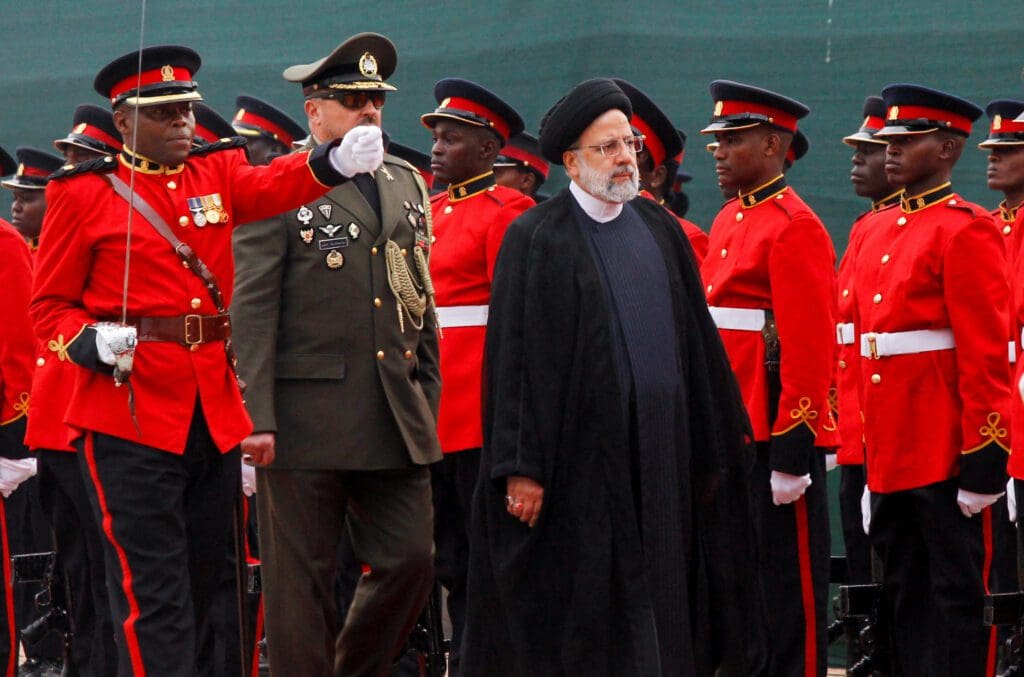In July, Iranian President Ebrahim Raisi embarked on a three-country tour in Africa to expand relations on the continent, the first of its kind by an Iranian leader in more than a decade. The trip, to Kenya, Uganda and Zimbabwe, followed a similar visit to Latin America. Both were part of a strategic push by Iran’s Supreme Leader Ali Khamenei to bypass crippling Western-imposed sanctions by developing stronger trade relations in the Global South.
Hoping to rally nations with a shared antipathy towards American hegemony, the Iranian initiative employs the anti-imperialist rhetoric that is a staple of the regime in Tehran. It seeks to leverage the country’s low-cost technology and expertise to develop trade relations in areas of the globe in which its presence is currently limited. Yet despite its best efforts, Tehran is handicapped by a lack of resources to tackle this huge task. Moreover, its ideological commitment to opposing the United States only raises the costs of doing business with it.
Radical Diversification
Since taking office in August 2021, Raisi has been committed to a foreign policy in line with Khamenei’s worldview, which sees efforts to lift U.S. sanctions as futile. While not completely against nuclear diplomacy with Washington, Khamenei sees sanctions-busting as the best means of countering U.S. efforts to contain Iran. This is evident in his push for a strictly quid pro quo approach in Iran’s diplomacy with the U.S.; one that is confined to the nuclear program and transactional in nature, whereby every agreed limitation Tehran accepts must be met with the lifting of a specific sanction.
In parallel, Khamenei’s so-called resistance discourse calls for a radical diversification of Iran’s foreign policy towards emerging Asian powers, the former European colonies of Africa and Latin America, and, more broadly, countries whose leaders share Khamenei’s anti-imperialist perspective on the Western, especially American, presence in the Global South. In other words, Khamenei’s doctrine does not confine Iran’s geopolitical reach to its immediate neighborhood. Rather, it calls for nurturing blocs of resistance around the globe. In 2019, Khamenei urged commanders of the Islamic Revolutionary Guard Corps, a branch of the Iranian military with vast economic interests, “not miss this vast geography of resistance; we should not be satisfied with our region [only].”
Africa’s history of struggle against colonialism means Tehran views the continent as fertile territory for expanding ties. Yet Raisi believes his predecessor, Hassan Rouhani, completely neglected it as a strategic priority. Rouhani’s entire foreign policy agenda revolved around the lifting of sanctions through pursuing an agreement with the U.S., a policy that later hit a wall with President Donald Trump’s decision to withdraw from the agreement.
Raisi, by contrast, has talked up Iranian-African cooperation and said his government would not hesitate to put the country’s entire diplomatic resources into the effort to “activate” cooperation with African states.
In a sense, Iran is following the lead of its regional rivals in the Gulf and Turkey, which have been very active in expanding economic and political relations in Africa and beyond over the past decade or more. Yet the intensification of Iranian diplomacy in Africa is not new. Although Rouhani may have largely ignored the continent, previous governments had not.
During the first term of President Mahmoud Ahmadinejad starting in 2005, as Western pressure on Iran mounted, Tehran sought to establish and deepen bilateral ties with a number of African countries through aid and energy diplomacy. At the time, forging ties in Africa was considered to be a prudent and cost-efficient way of countering sanctions and shoring up support and votes at the United Nations and the International Atomic Energy Agency. The initiative was ultimately rolled back due to Iran’s worsening economic situation, precipitated by falling energy prices and tighter sanctions during Ahmadinejad’s second term.
Raisi’s venture into Africa is motivated by the same set of goals as Ahmadinejad’s. This is most evident in both his stark anti-imperialist statements aimed at shoring up a sense of solidarity between Iran and the host nations as well as the various agreements signed during Raisi’s trip.
However, unlike Ahmadinejad, Raisi engagement is also partly motivated by competition with Iran’s regional rivals, who have expanded their influence in Africa of late. While Iran currently lacks the resources of its Gulf and Turkish counterparts, Iranian officials appear to believe that they have competitive advantages in terms of human resources and knowledge-based companies, with considerably cheaper technical know-how, especially in the fields of energy, medicine, defense and ICT.
Ironically, life under sanctions has strengthened Iran in this regard. Largely cut off from global supply chains and with few financial resources to be able to buy off the shelf, Iran has had to develop an indigenous technological ecosystem to satisfy its own security and commercial needs. Add the weakness of its currency, its lower costs of labor and production, and it now finds itself in a fortunate position whereby it can market its technology as a cheaper alternative to Western ones, creating a niche for itself amongst the other states operating on the continent. T his technological prowess, in turn, is complemented by Iran’s loose export policy and its eagerness to use its expertise to generate revenue and influence.
Such a strategy could prove attractive in a region where budgetary constraints tend to limit countries’ abilities to forge long-term, mutually beneficial commercial relations. It is worth noting that the Iran House of Innovation and Technology, a Tehran-based startup incubator, has already opened a branch in Kenya, the University of Tehran School of Medicine has started cooperating with the Ghana-based African Health Development Center, and a specialized office for the export of Iranian biotechnology products has been established in Kampala, Uganda.
For Domestic Consumption?
However, notwithstanding the fanfare in the conservative-leaning media in Tehran, Raisi’s African agenda is likely to face the same fate as that of Ahmadinejad’s. Given the dire state of the Iranian economy as well as the crippling restrictions sanctions place on its trading relations with the outside world, Tehran’s ambitions for a more substantive presence in Africa is unlikely to bear any meaningful fruit. Although its less expensive technology and know-how could be an attractive alternative to some Western technologies in some corners of the continent, the Islamic Republic has been holding itself back.
Tehran’s over-commitment to anti-Americanism has made the costs of cooperating with Tehran far greater than they would otherwise be. From the perspective of African states, U.S. financial markets remain vitally important to the health of their already fragile economies, and many would be reluctant to risk limiting their access to that market by establishing fully fledged commercial and diplomatic ties with Tehran.
This begs the question of why Tehran would embark on such an effort without the resources it needs to accomplish its goals. The answer lies in Iran’s domestic politics and Raisi’s need to showcase his foreign policy achievements to both critics and supporters. For a president whose main foreign policy agenda is to strengthen Iran’s ties with the Global South, trips like these and the resulting agreements can be used as “proof of achievement” to silence or discredit the allegedly Western-leaning opposition. One example is the way in which Iran’s membership of the Shanghai Cooperation Organization was portrayed as a Raisi victory, even though the entire groundwork was laid by Rouhani’s government.
Raisi’s trip could also directly benefit his support base, who can sanction-proof themselves by monopolizing the potential commercial benefits of any ensuing deals. Given the dominance of hardliners in Iran’s private sector and their monopolistic control over the country’s financial resources, they alone are able to take advantage of deals like those Raisi signed in July. Building petrochemical refineries and setting up pharmaceutical production plants are capital-intensive ventures. Apolitical Iranian entities in the private sector simply cannot afford to take part.
As such, Raisi’s Africa agenda, and indeed the entire resistance discourse, will do little if anything to mitigate the effects of sanctions on the Iranian public. In a totalitarian regime under sanctions, however, this does not matter, as long as foreign policy feeds the interests of the regime’s core elites.
The logic here is straightforward: increased trade opportunities for hardliners at home and abroad translate into continued political support for Raisi.
The opinions expressed in this article are those of the author and do not necessarily reflect the views of the Middle East Council on Global Affairs.


